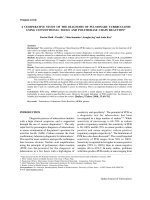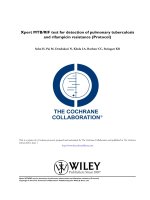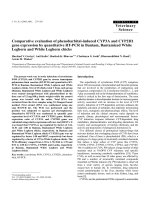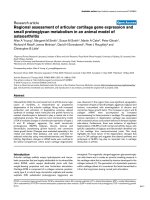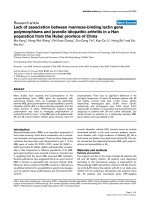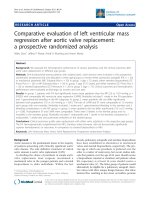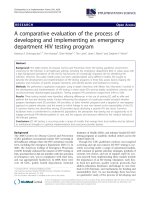Comparative evaluation of gene xpert and various staining techniques in the diagnosis of pulmonary tuberculosis
Bạn đang xem bản rút gọn của tài liệu. Xem và tải ngay bản đầy đủ của tài liệu tại đây (202.24 KB, 7 trang )
Int.J.Curr.Microbiol.App.Sci (2021) 10(06): 532-538
International Journal of Current Microbiology and Applied Sciences
ISSN: 2319-7706 Volume 10 Number 06 (2021)
Journal homepage:
Original Research Article
/>
Comparative Evaluation of Gene Xpert and Various Staining Techniques in
the Diagnosis of Pulmonary Tuberculosis
Loveena Oberoi1, Naveen Pandhi2, Muskan Khullar1* and Tavishi Oberoi1
1
Department of Microbiology, 2Department of Chest and TB, Government Medical College,
Amritsar, India
*Corresponding author
ABSTRACT
Keywords
Ziehl Neelsen (ZN)
staining, Kinyoun
staining,
Fluorescent
staining,
Tuberculosis (TB),
Mycobacterium
tuberculosis
(MTB), N-acetyl-Lcysteine (NALC)
Article Info
Accepted:
20 May 2021
Available Online:
10 June 2021
Tuberculosis (TB) is an ancient communicable disease caused by Mycobacterium
tuberculosis. In India, RNTCP (Revised national tuberculosis control program)
now known as NTEP (National tuberculosis elimination program) endorsed
diagnostic steps to diagnose TB infection and disease are followed. To study the
diagnostic efficacy of GeneXpert in comparison to various staining techniques in
patients suspected of pulmonary tuberculosis. 150 sputum samples from patients
clinically suspected of pulmonary tuberculosis were processed and subjected to
Ziehl-Neelsen staining, Kinyoun Staining and Fluorescent staining.
Simultaneously GeneXpert was performed on unprocessed samples. Out of 150
samples, GeneXpert detected 46 (30.67%) cases followed by Fluorescent staining,
44(29.33%), ZN staining 43 (28.67%) cases and Kinyoun staining detected the
least i.e. 35(23.33%). Amongst 46 positive cases detected by GeneXpert
7(15.22%) cases were found to be resistant to Rifampicin. Hence it proved the
efficacy and sensitivity of GeneXpert over staining methods. Tuberculosis is a
global pandemic. Its early diagnosis and timely initiation of treatment is necessary.
Therefore, GeneXpert when used in conjunction with microscopy improves
detection of tuberculosis and multi drug resistant tuberculosis.
Introduction
Tuberculosis (TB) is potentially infectious
disease
caused
by
Mycobacterium
tuberculosis, which can affect any part of the
body with the lungs being the most common
organ
involved.1
The World
Health
Organization (WHO) estimates that 1.8 billion
people-close to one-quarter of the world's
population-are infected with this deadly
disease. 2In the Indian scenario, the estimated
TB incidence is about 27 lakh with the
majority of the affected individuals being in
the age group of 15-69 years and 2/3rd being
males. 3Rapid and accurate diagnosis of
pulmonary tuberculosis followed by prompt
treatment with effective anti-TB drugs is the
cornerstone of TB management and
532
Int.J.Curr.Microbiol.App.Sci (2021) 10(06): 532-538
elimination of transmission as endorsed by
RNTCP, now known as NTEP.
Sputum smear microscopy by Ziehl-Neelsen
staining is considered as the most common
diagnostic test available. But nowadays,
Fluorescent microscopy is being preferred
over conventional light microscopy as it is
more efficient and can help in diagnosing TB
at the earliest.4Another potential alternative to
ZN Staining is Kinyoun’s Cold Acid Fast
staining which differs from former as in that
case heating is not required, phenol
concentration in carbol fuchsin is increased
and duration of carbol fuchsin staining is
more.5 The only demerit of microscopy is low
sensitivity(50-80%) relative to culture. The
sensitivity of microscopy can be improved by
prior sputum decontamination methods by NAcetyl-L-Cysteine
Sodium
Hydroxide
(NALC-NaOH) method and bleach method
using 5% Sodium Hypochlorite.6
Newer molecular techniques like GeneXpert
MTB/RIF assay is another diagnostic platform
which is automated, cartridge based, closed
system that performs real-time PCR and can
be used by operators with minimal technical
expertise, enabling diagnosis of TB and
simultaneous assessment of rifampicin
resistance to be completed within 2 hours
leading to timely initiation of treatment with
minimal biohazard. 7, 8
The main objectives of this study to evaluate
efficacy of GeneXpert and comparative
evaluation of GeneXpert with various staining
techniques in the suspected cases of
pulmonary tuberculosis.
Materials and Methods
The present cross sectional study was
performed in Microbiology Department in
collaboration with Chest & TB hospital and
other wards of Guru Nanak Dev Hospital,
Amritsar. A total of 150 Sputum samples from
Patients with clinical suspicion of pulmonary
tuberculosis including symptoms of cough
with or without expectoration for >2 weeks,
weight loss, fatigue, hemoptysis, and loss of
appetite and attending outpatient and indoor
service were included in the study.
The Patients already taking anti-tubercular
drugs and cases of extra pulmonary
tuberculosis were excluded from the study.
Sample Collection and Processing
Sputum samples were collected from these
cases in sterile leak proof containers as per
RNTCP guidelines.9Sample was divided into 2
parts: one part used for GeneXpert and rest
was divided for direct microscopy and
decontamination and concentration procedure
by
NALC-NaOH
and
5%
Sodium
hypochlorite (NaOCl) or bleach method.
Smears prepared by direct method and
decontamination method were subjected to
Ziehl-Neelsen staining, Kinyoun staining and
Auramine-O staining. The decontaminated
samples were inoculated on Lowenstein
Jensen Medium slopes (LJ Medium).
Interpretation
Acid fast bacilli (AFB) were seen as red,
beaded rods when assessed under oil
immersion (X 100) lens.
The smears were graded as per RNTCP
guidelines for ZN and Kinyoun staining.
Whereas for Fluorescent staining the tubercle
bacilli appeared bright brilliant greenish
yellow against dark background using 40 X
lens using Fluorescent microscope and graded
as per RNTCP grading for Fluorescent
microscopy using Auramine-O stain Reporting
scale.10
533
Int.J.Curr.Microbiol.App.Sci (2021) 10(06): 532-538
Gene Xpert
GeneXpert assay was put as per
Manufacturer’s instructions (Cepheid Inc.)
and cartridge was loaded into the Gene Xpert
Module. The results were read after 2 hours
and interpreted as MTB Detected/ MTB Not
detected and RIF resistance detected/not
detected.11
Results and Discussion
Out of 150 patients, maximum number of the
cases was in the age group 21-40 years
followed by 41-60 years with mean age being
41.17 years and Male to female ratio was
1.2:1. Most common complaints by the
patients were cough (100%), fever (80%),
dyspnoea (62%), followed by night sweats
(42%), generalized weakness (36%), weight
loss (30%), hemoptysis (24%) and headache
(10%).
By ZN staining method, 38 (25.33%) cases
were positive for AFB and 112 (74.67%) cases
were negative before decontamination i.e.
direct microscopy. After decontamination by
NALC-NaOH method43 (28.67%) cases were
positive and 107 (71.33%) cases were
negative for AFB. By Bleach processing it
detected 39 (26%) positive cases and 111
(74%) negative cases. (Table 1)
With Kinyoun Staining, 32(21.33%) cases
were positive for AFB and 118(78.67%) cases
were
negative
for
AFB
before
decontamination. 35(23.33%) cases were
positive for AFB and 115 (76.67%) cases were
negative for AFB after decontamination by
NALC-NaOH
method.
After
bleach
processing 32(21.33%) positive cases and
118(78.67%) negative cases were detected
(Table 1).
By Fluorescent staining using Auramine-O, 40
(26.67%) cases were positive for AFB and
110(73.33%) cases were negative for AFB
before
decontamination.
After
decontamination by NALC-NaOH method 44
(29.33%) cases were positive and 106
(70.67%) cases were negative for AFB. After
Bleach processing 41(27.33%) positive cases
and 109(72.67%) negative cases were detected
(Table 1).
Among 150 samples, only 24 (16%) sputum
samples were found to be culture positive and
85 (56.67%) were negative and 41 (27.33%)
showed contamination on LJ culture.
The total number of positive cases detected by
GeneXpert MTB/RIF were 46 (30.67%) and
104 (69.33%) were negative by GeneXpert
MTB/RIF. Out of total 46 positive cases
detected by GeneXpert MTB/RIF, 7(15.22%)
cases were found to be resistant to Rifampicin.
All the remaining positive cases were found to
be sensitive to Rifampicin drug. (Table 2)
GeneXpert
MTB/RIF
system
showed
maximum sensitivity and specificity (100%),
followed by Auramine-O which had 86.96%
sensitivity and 100% specificity. ZiehlNeelsen staining showed 82.61% sensitivity
and 100 % specificity followed by Kinyoun
staining which was 69.57% sensitive and
100% specific (Table 3).
Tuberculosis is an infectious disease which
still remains to be a foremost public health
risk worldwide. One fourth of the global
incident TB cases occur in India annually.
Even though there is an availability of many
highly sensitive diagnostic tools, early case
detection plays a significant role in control of
the disease which relies specially on the
detection of acid-fast bacilli in clinical
samples by microscopy. 12 For early
diagnostics and management of TB, various
Microscopy methods are available using Ziehl
Neelsen, Kinyoun and Fluorescent staining
methods.
534
Int.J.Curr.Microbiol.App.Sci (2021) 10(06): 532-538
Table.1 Sputum smear microscopy findings after various Staining methods
ZN Staining
Kinyoun Staining
Fluorescent Staining
Direct microscopy
38
32
40
(n=150)
After Bleach
39
32
41
After NALC-NaOH
43
35
44
Table.2 Case detection by three different staining methods and GeneXpert
ZN Staining
Positive
Negative
43(28.67%)
107(71.33%)
Kinyoun
Staining
35(23.33%)
115(76.67%)
Fluorescent
Staining
44(29.33%)
106(70.67%)
GeneXpert
46(30.67%)
104(69.33%)
Table.3 Comparison of various staining techniques with GeneXpert
Diagnostic techniques
Sensitivity
(%)
Specificity
(%)
Ziehl-Neelsen Staining
Kinyoun Staining
Fluorescent staining
GeneXpert
82.61%
69.57%
86.96%
100%
100%
100%
100%
100%
To improve turn around time, Cartridge based
Nucleic Acid Amplification techniques i.e.
CBNAAT also known as GeneXpert
MTB/RIF are nowadays preferred choice due
to its rapid results, high sensitivity and no
technical expertise.
In the present study on comparing the three
different staining methods, detection rate of
acid
fast
bacilli
(AFB)
by prior
decontamination was more with Fluorescent
(29.33%), followed by Ziehl Neelson (ZN)
(28.67%) and then by Kinyoun staining
(23.33%).Studies conducted by Lawrence et
al., and Purusothaman K et al., were also in
concordance with present study.10, 13Another
study by Saroj et al., demonstrated the
superiority of Auramine-O staining over
Ziehl-Neelsen staining.4 Though Fluorescent
microscopy is more sensitive than ZiehlNeelsen staining, but real disadvantage of
Positive
Predictive
Value (%)
100%
100%
100%
100%
Negative
Predictive
Value (%)
92.86%
88.14%
94.55%
100%
flourochrome method is that fluorescence
fades with time along with cost of microscopy.
Therefore slides must be read within 24 hours.
Whereas ZN staining is preferred by most of
the countries in the globe, especially in
developing countries because of its simplicity
and cost efficiency. The only disadvantage of
ZN staining is its low utility in HIV- TB coinfected patients and extra pulmonary
TB.14Nowadays WHO recommends that
conventional fluorescence microscopy be
replaced by LED microscopy and that LED
microscopy be phased in as an alternative to
the conventional ZN microscopy in all small
as well as big laboratories.15
Sputum is contaminated with saliva, mucus
and normal flora therefore; decontamination
concentrates the bacilli and significantly
increases the detection rate. 9In present study,
the detection rate of AFB improved after
535
Int.J.Curr.Microbiol.App.Sci (2021) 10(06): 532-538
decontamination by NALC-NaOH method
more as compared to Bleach method. Similar
studies were also reported at Dhaka16 and By
Kumar et al., which supports present study
and hence these are comparable.13
Low culture positivity (16%) in the present
study could be explained by complex selection
pressure present in the medium that did not
allow small number of bacilli in the sputum to
grow.17 Another reason for low recovery of
bacilli could be due to lack of achievement of
exact
point
of
neutralization
after
decontamination. 18
Staining techniques when compared with
Gene Xpert it was found that Gene Xpert is
more sensitive and specific (100%) detecting 2
additional MTB positive cases which were
labeled as sputum smear negative. Out of total
46 positive cases detected by GeneXpert
7(15.22%) cases were found to be resistant to
Rifampicin. All the remaining positive cases
were found to be sensitive to Rifampicin drug.
Amongst staining techniques, Fluorescent
staining was more sensitive followed by ZN
staining and Kinyoun staining.
In a study by Aggarwal et al., and Ondimu TO
et al., GeneXpert had a higher sensitivity than
AFB smear microscopy in respiratory samples
similar to our study. 19,20In a study by Nakate
Prasanna et al., GeneXpert indicated higher
sensitivity for detection of TB bacilli as
compared to staining methods. 21In a study by
Dzodanu Eben et al., 35.5%, 23%, and 42%
were positive for pulmonary tuberculosis
when Fluorescent staining, ZN staining, and
XPERT MTB/RIF assay were conducted
showing similar trend as present study.22
Gene Xpert was closed system test which
reduced the chance of contamination of the
samples and minimized false interpretations.
Positive GeneXpert, but culture negative
results should be read cautiously and be well
correlated with clinical and treatment history
of the patient. The other major advantage of
Gene Xpert was that it simultaneously
detected Rifampicin resistance and especially
beneficial in patient with MDR and HIV
associated tuberculosis.
The detection limit of Gene Xpert was 131
bacilli/ ml which make it more sensitive and
reliable test. It could detect small number of
bacilli in sputum sample. GeneXpert can be a
useful tool for early diagnosis of patients with
high clinical suspicion of pulmonary
tuberculosis.
Amongst all of the staining techniques
studied, Fluorescent staining detected more
number of Acid fast bacilli in sputum samples
followed by Ziehl-Neelsen staining and
Kinyoun staining.
Moreover, the various decontamination
methods used increased the detection rate of
acid fast bacilli in previously negatively
labeled sample hence increasing the diagnostic
yield in detecting the bacilli. GeneXpert
MTB/RIF had higher sensitivity and
specificity as compared to the three staining
methods used in our study. GeneXpert test not
only detected the M. tuberculosis but also
detected Rifampicin resistance which was an
added advantage over staining methods.
Tuberculosis is a global pandemic. Its early
diagnosis and timely initiation of treatment is
necessary. The compliance of treatment is also
necessary to prevent MDR-TB. In this context,
GeneXpert MTB/RIF is a valuable diagnostic
test which helps in detecting Tuberculosis in
just 2 hours along with Rifampicin resistance.
It is also beneficial for pediatric patients and
HIV-AIDS patients which usually come out to
be sputum smear negative. Therefore,
GeneXpert when used in conjunction with
microscopy improves detection of tuberculosis
and multi drug resistant tuberculosis.
536
Int.J.Curr.Microbiol.App.Sci (2021) 10(06): 532-538
References
1.
2.
3.
4.
5.
6.
7.
8.
Hymavathi R, Swarnalatha G, Nagajyothi
B, Reddy BS. Evaluation of CBNAAT in
the diagnosis of smear negative
tuberculosis in a tertiary care hospital.
Journal of Evolution of Medical and
Dental
Sciences.
2017
Nov
20;6(90):6273-7.
A Global Threat [Internet]. T B Alliance.
2020 [cited 5 September 2020]. Available
from:
/>T B Statistics India - latest numbers – T B
Facts [Internet]. T B Facts. 2020 [cited 17
September 2020]. Available from:
/>Bhumbla U. A comparative study of
Ziehl-nelson staining and auramine
staining in sputum sample for the
diagnosis of pulmonary tuberculosis.
International Journal of Biomedical
Research. 2014;5(6):383-5.
Sastry A, Sandhya B. Essentials of
Medical Microbiology. 2nd ed. Delhi:
Jaypee Brothers Medical Publishers;
2018.
Kumar G A, Chandrasekaran S,
Visalasree J, Kanna B V. Bleach method
in comparison with NALC-NaOH
specimen processing method for the
detection of mycobacterium in sputum
specimen. International Journal of
Research
in
Medical
Sciences.2017;5:3865-3868.
World Health Organization. Automated
real-time nucleic acid amplification
technology for rapid and simultaneous
detection of tuberculosis and rifampicin
resistance: Xpert MTB. World Health
Organization; 2013.
Boehme C C, Nicol M P, Nabeta P,
Michael J S, Gotuzzo E, Tahirli R, Gler
M T, Blakemore R, Worodria W, Gray C,
Huang L. Feasibility, diagnostic accuracy,
and effectiveness of decentralised use of
9.
10.
11.
12.
13.
14.
15.
16.
537
the Xpert MTB/RIF test for diagnosis of
tuberculosis and multidrug resistance: a
multicentre implementation study. The
lancet. 2011 Apr 30;377(9776):1495-505.
Revised National T B Control Programme
Training Manual for Mycobacterium
tuberculosis
Culture
and
Drug
susceptibility testing; 2009.
Lawrence, Debbarma Madhumita, Baveja
C. P., Kumar Surinder, Khanna Ashwani,
Sapriina Joseph. Comparative evaluation
of fluorescent staining with ziehl-neelsen
and kinyoun staining in the diagnosis of
clinically suspected cases of pulmonary
tuberculosis. Int J Contemp Med Res
2016;3(7):1970-1974.
Lawn S D, Nicol M P. Xpert® MTB/RIF
assay: development, evaluation and
implementation of a new rapid molecular
diagnostic for tuberculosis and rifampicin
resistance. Future microbiology. 2011
Sep;6(9):1067-82.
Amar Kumar G, Chandrasekaran S,
Visalasree J, Vignesh Kanna B. Bleach
method in comparison with NALC-NaOH
specimen processing method for the
detection of mycobacterium in sputum
specimen. International Journal of
Research in Medical Sciences. 2017
Sep;5(9):3865.
Purusothaman K, Bhattacharjee K, Joshi
S, Vasanthakumari R. Comparative
efficacies of three acid-fast staining
techniques under field conditions for
Mycobacterium tuberculosis in the Indian
context. The Internet Journal of
Microbiology. 2009;9:49-51.
Fluorescent light- emitting diode (LED)
microscopy for the diagnosis of
pulmonary tuberculosis. WHO, Geneva,
Switzerland. 2010.
Report of the 9th meeting of STAG-TB,
Geneva, Switzerland. World Health
Organization, Geneva, Switzerland, 2007.
Menon S, Dharmshale S, Chande C,
Gohil A, Lilani S, Mohammad S, et al.,
Int.J.Curr.Microbiol.App.Sci (2021) 10(06): 532-538
Drug
resistance
profiles
of
Mycobacterium tuberculosis isolates to
first line anti‑tuberculous drugs: A five
years study. Lung India.2012;29:227‑231.
17. Mechal Y, Benaissa E, Benlahlou Y,
Bssaibis F, Zegmout A, Chadli M, Malik
Y S, Touil N, Abid A, Maleb A,
Elouennass M. Evaluation of GeneXpert
MTB/RIF system performances in the
diagnosis of extrapulmonary tuberculosis.
BMC
Infectious
Diseases.
2019
Dec;19(1):1-8.
18. Kassaza K, Orikiriza P, Llosa A, Bazira J,
Nyehangane D, Page A L, Boum Y.
Lowenstein-Jensen selective medium for
reducing
contamination
in
Mycobacterium tuberculosis culture.
Journal of clinical microbiology. 2014 Jul
1;52(7):2671-3.
19. Agrawal M, Bajaj A, Bhatia V, Dutt S.
Comparative study of GeneXpert with ZN
stain and culture in samples of suspected
pulmonary tuberculosis. Journal of
clinical and diagnostic research: JCDR.
2016 May;10(5):DC09.
20. Ondimu T O, Grace M O, Samson A O,
Asito S A. Comparative study of smear
microscopy, GeneXpert and culture and
sensitivity assays in detection of
mycobacterium tuberculosis on sputum
samples among tuberculosis suspected
cases in Nyamira County referral hospital.
Mycobacterial diseases. 2017;7.
21. Nakate P, Patil S, Patil S, Purohit H,
Shelke Y, Kinare S. Comparison of
diagnostic efficacy of GeneXpert
MTB/RIF assay with Ziehl Neelsen
staining & microscopy in diagnosis of
pulmonary tuberculosis. International
Journal of Medical Microbiology and
Tropical diseases.2019;5(4):218-221.
22. Dzodanu E G, Afrifa J, Acheampong D
O, Dadzie I. Diagnostic yield of
fluorescence and Ziehl-Neelsen staining
techniques in the diagnosis of pulmonary
tuberculosis: A comparative study in a
district health facility. Tuberculosis
research and treatment. 2019 Apr
10;2019.
How to cite this article:
Loveena Oberoi, Naveen Pandhi, Muskan Khullar and Tavishi Oberoi. 2021. Comparative
Evaluation of Gene Xpert and Various Staining Techniques in the Diagnosis of Pulmonary
Tuberculosis. Int.J.Curr.Microbiol.App.Sci. 10(06): 532-538.
doi: />
538
